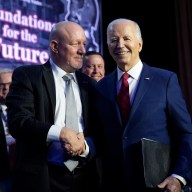By Jonathan Saul and Parisa Hafezi
LONDON/ANKARA (Reuters) – Iran has asked the Bank of England to set up special clearing accounts for its banks, but has so far been rebuffed in its effort to resolve an impasse that has left it excluded from banking in London more than a year after sanctions were lifted. Tehran has been hoping for swift reintegration into global trade after its deal in 2015 aimed at curbing Tehran’s nuclear program in return for the lifting of international sanctions. Its failure to persuade Western banks to accept its business has been one of the main choke points preventing its rehabilitation. Banking sources from both Iran and the West, and Iranian political sources close to the talks, said Tehran has approached the Bank of England to seek clearing accounts directly with the UK central bank. Such accounts, for Iran’s own Central Bank or for the British subsidiaries of Iranian banks, would allow them to make and receive payments in sterling, business so far rejected by commercial banks. “That would send a huge message to the market. What commercial bank is practically going to stop Bank of England payments? None,” said one Western source.
However, the sources said the BoE seems uninterested in resolving the problem for now.
“The Bank of England has proved resistant to intervening in any kind of positive way in order to assist trade between Iran and UK,” said the Western source.
A senior Iranian banking official in Tehran said: “The Bank of England has suspended anything related to Iran, even the latest scheduled meeting was canceled. Everything has been put on hold.” A Bank of England spokesman declined to comment. Iran’s Central Bank officials were not available to comment.
The sources all spoke on condition of anonymity as talks between Iran and the bank have not officially been made public.
Although EU and United Nations sanctions over Iran’s nuclear program were lifted a year ago, the United States still has separate measures in place over Iran’s missile program, and the new U.S. administration has promised a hard line. The risk of falling afoul of U.S. measures has been enough to persuade Western banks to steer clear, including in London, where Iran is particularly keen for a presence in the main global financial center outside of the United States. Even Iran’s embassy in London has so far been unable to open a British bank account.
Three Iranian banks have subsidiaries with licenses to operate in Britain: Melli Bank Plc, Bank Sepah International Plc and Persia International Bank Plc. But none has been able to persuade a commercial bank to clear its payments in sterling, the British currency. “TOTALLY UNACCEPTABLE”
“It is totally unacceptable that a UK bank which has a banking license, which is in good standing with its regulators, is unable to access the sterling system,” said Sue Millar, partner with law firm Stephenson Harwood that represents those three UK-based arms of Iranian banks, as well as Bank Saderat Plc, which remains on the U.S. blacklist. Iran considers the failure of Western countries to allow it back into the international financial system to violate the spirit of the 2015 nuclear deal. It says Britain in particular, given its large capital markets, should do more to ensure Iranian banks operating there legally are treated fairly. The issue is particularly sensitive within Iran for the future of the nuclear deal’s architect, President Hasan Rouhani, a pragmatist elected in a landslide in 2013 on a promise to reduce Iran’s economic isolation. He faces re-election in May against hardliners who say his deal has never yielded the promised economic benefits. The UK government, eager to boost trade with new markets like Iran after last year’s vote to leave the European Union, has struggled to convince British banks to boost trade with Iran, sources have told Reuters. British trade minister Liam Fox told a parliamentary committee last week he had commissioned work from his department to look at how to normalize “effective payment channels” with Iran to try to open up trading opportunities. An official close to Rouhani said while the British government had promised to do more, so far there had been no progress. The senior Iranian banking official added that meetings between Iranian and British government officials had yielded no change in the commercial banks’ policies. “They (banks) are worried about Trump’s Iran approach – and now that Iran has been ‘put on notice’, the process will be much more difficult,” the official said, referring to remarks made in Washington last month by then U.S. national security advisor Michael Flynn threatening an unspecified response after an Iranian ballistic missile test. In response to questions from Reuters, the British government said it was committed to working closely with all parties, including UK banks and industry groups, to help open opportunities for trade between Britain and Iran. “This will be a vital part of Iran’s re-integration into the international community and we will continue to work to strengthen and expand our trading relationship for mutual benefit,” said a statement attributed to a government spokesperson. “IRANOPHOBIA”
In April last year, Iran’s Supreme Leader Ayatollah Ali Khamenei accused Washington of undermining the nuclear deal by scaring investors away from Iran.
“On paper America lets foreign banks deal with Iran, but in practice they create Iranophobia so no one does business with Iran,” Khamenei said at the time.
In addition to concern over the remaining U.S. sanctions, banks are wary of business with Iran because of the high cost of ensuring that any transactions comply with rules.
Iran is one of just two countries, along with North Korea, declared “high risk and non-cooperative jurisdictions” by the Financial Action Task Force (FATF), a global group of nations that monitors money laundering. Iran is implementing an “action plan” to have that designation lifted, and the watchdog has set a June 2017 deadline to evaluate its progress. Meanwhile, the FATF still advises countries to tell their banks to impose extra due diligence on transactions with Iranians. The FATF’s guidance cites in particular the risk of funding terrorism. Banking officials said reintegrating Iranian banks into the financial system would take time, and may require support from the government to help allay the cost to commercial banks of taking on added risk and performing additional checks. “When you have had such broad ranging sanctions over such a long period of time, it is completely unrealistic to re-enter this space without considerable risk analysis. That may involve creative risk sharing,” said Justine Walker, director financial crime with industry lobby the British Bankers’ Association. “So, industry will be looking at some kind of tie up with government.”
For Iranians hoping to trade abroad, that means waiting.
“As a businessman, I cannot open an account in Britain’s major banks. How am I supposed to do business with the world?”said the chief executive of an import-export company in Tehran, who asked not to be identified. (Editing by Peter Graff)















